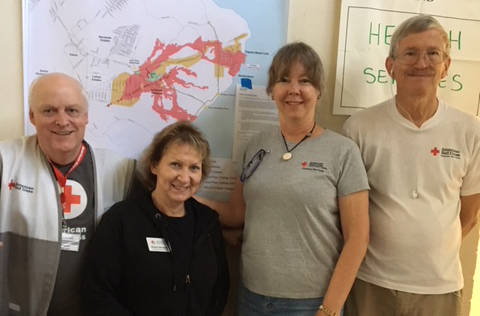Annie Caulfield saw tears in the old man’s eyes.
The man had lost his home to the flowing lava that came from the Kilauea volcano eruption in Hawaii in May, and Caulfield was working as a mental health service associate for the Red Cross.
As Caulfield, a Juneau resident, spoke to the man, she realized the tears weren’t of sadness or rage, but of joy.
The man’s wife was agoraphobic, meaning she was afraid to leave the house. When the lava forced her to leave the house, it was the first time she did so in two years. As he spoke with Caulfield, the man expressed awe for the Hawaiian goddess of fire, lightning, wind and volcanoes Pele, a key figure in Hawaiian mythology and life.
“At the same time they’re displaced, they have deep and abiding respect for Pele, for the volcano,” Caulfield said. “It doesn’t have the same despair (as other natural disasters), in a way.”
That positive attitude in the face of destruction and loss, Caulfield said, has stuck with her since she got back from her deployment with the Red Cross in May. She and fellow Juneau resident Chip Wagoner went to the Big Island as Red Cross volunteers after the massive volcano began erupting May 3.
Wagoner, who was a shelter supervisor during his three weeks on the Big Island in May, also said he was impressed with the way people responded to the loss of their home or land with an open mind. He spoke of a woman who came into the shelter one day and said she had accepted she had lost her home and was already thinking about how to move forward.
“The Hawaii culture is very helpful that the people have because they were very resilient and they were very calm,” Wagoner said.
Since the eruption began May 3, it has destroyed more than 600 homes and forced thousands of residents to evacuate, the Associated Press reported Tuesday. As of mid-June, according to the Red Cross, more than 360 Red Cross workers had provided more than 5,000 overnight stays for people in shelters.
Though many of the displaced locals had a positive attitude about their situation, danger was still abundant for them and the Red Cross volunteers on the island, Wagoner said. Wagoner, who also worked as a volunteer at a large emergency kitchen after Hurricane Harvey last year, said a volcanic eruption is different from some other disasters in that a simple change in the wind can completely change the path of the destructive lava.
“If the trade winds had changed, the air from the lava flow would have reversed direction and if it had gotten serious enough, we would have had to evacuate where we were,” Wagoner said.
Fortunately, it didn’t come to that. Wagoner managed the shelter at night, working a 12-hour shift that usually turned into a 13-hour shift, he said. He said one of his main tasks was working with the County of Hawaii, as the county owned the senior community center where his shelter was. He also helped shelter workers, health workers, mental health workers such as Caulfield and others work together.
Both Caulfield and Wagoner said they learned both from the residents and from their fellow volunteers, who were from all around the country. Caulfield was in a six-person volunteer group with people from California, Oregon and Washington.
Caulfield, a retired school counselor who used to work at Juneau’s Harborview Elementary School, said this was her second deployment for the Red Cross. The first was to Florida in the aftermath of Hurricane Irma last year, but this one meant a little more because she grew up in Hawaii. Her job as a mental health service associate was to hear people’s stories and support them through their search for resources.
“I did a lot of listening and a lot of hugging and helping people start thinking about and planning the next steps,” Caulfield said.
Caulfield did most of her work in the day and Wagoner worked at night, so they didn’t see each other much. Neither of them saw the volcano erupting, as they were both too busy, but Caulfield said they could hear the rumbling of the volcano. She also said the eruption would turn the night sky red, almost like a sunset, and she gazed at that at night.
They’ve both been back in Juneau for more than a month at this point, but their thoughts still return to the people they met who were so proud and so optimistic in the face of destruction.
“They really tugged at my heart,” Wagoner said. “There were some very heartwarming stories.”
• Contact reporter Alex McCarthy at 523-2271 or amccarthy@juneauempire.com. Follow him on Twitter at @akmccarthy.

